Enjoying Life Without Compromise: HRT for Women in Rochelle Park, NJ
If there's one universal truth, it's that all of our bodies begin changing at some point. That's especially true for women who are over the age of 50. One day it seems like we're rolling out of bed with a pep in our step. The next, our emotions are out of control, our weight won't go down, and we constantly have hot flashes. If that sounds like you, don't worry – millions of other women worldwide are going through the same difficulties.
The fact of the matter is these symptoms are part of a natural process women go through. This change, called menopause, marks the end of a woman's ability to reproduce and menstruate. The average age for this to occur is 51, though it officially begins a year after a woman's final period. During this transition to menopause, estrogen and other hormones in a woman's body start to deplete When those hormones deplete, frequent and sometimes severe symptoms can manifest:
The symptoms of hormone deficiency can be scary for both women and their partners. That makes dealing with a hormone deficiency tricky because many symptoms are tied to nutrition, stress, lack of exercise, and toxins in your body.
However, if you're getting older and dealing with some of the symptoms listed above, have hope. A solution to your hormone problems may be closer than you think. Hormone replacement therapy for women may help correct imbalances caused by menopause. These effective, safe treatments help many women throughout the menopause process and may even help them reclaim their youth.
Our HRT Services
- Enjoying Life Without Compromise: HRT for Women in Rochelle Park, NJ
- The Juventee Difference
- Juventee's Custom HRT Treatments for Women
- Benefits of HRT for Women in Rochelle Park, NJ
- Common Issues Women Experience During Menopause
- A New Youthful You Awaits at Juventee TRT in Rochelle Park, NJ
Services Area
Is HRT for Women the Right Answer?
To live a healthy life, hormone stability is very important for women. That's where the beauty of HRT treatments for women begins to shine because it balances hormones that would otherwise be altered due to menopause.
HRT treatments for women represent a revolutionary step toward living life without the pitfalls of old age. However, at Juventee, we understand that no two women, and by proxy, patients, are the same. That's why our team of doctors and specialists provide personalized treatment options for women, combining holistic treatment, nutrition, fitness plans, and more to supplement our HRT treatments.
Is HRT the answer if you feel exhausted, overweight, and moody? That's the million-dollar question that we're asked almost every day. And to be honest, it's hard to say without a comprehensive exam by an HRT expert at Juventee. What we can say is that when a woman's hormones are better balanced during menopause, she has a much better chance of enjoying life without the crippling symptoms that other women feel.
At Juventee, helping women reclaim their vitality and love of life is our top priority. While some HRT clinics see patients as nothing more than a means to make money, our team is cut from a different cloth.
The Juventee Difference
The key to balancing your hormones and improving your well-being is a process that we have refined over time. The Juventee HRT process consists of a comprehensive review of your health and hormonal status. Our team then customizes your plan and prescribes treatments, procedures, and supplements under the guidance of our local HRT experts.
At Juventee, we want to revitalize your health by promoting balance, energy, intimacy, and beauty. We start by assessing your baseline biomarkers and implementing a personalized plan to help you feel like your younger self. Our in-depth process covers many factors, almost like a web. Each component of that web works in conjunction with others to make up how you feel. If one area is out of sync, women can experience unwanted fluctuations in their weight, energy, emotions, libido, and more. Juventee is committed to evaluating our patient's overall health so that we may bring vitality and happiness to as many aspects of their lives as possible.
We've mentioned all the greatness that can come with an HRT regimen from Juventee, but what exactly are the benefits of HRT for women? Let's take a look.
We Work With

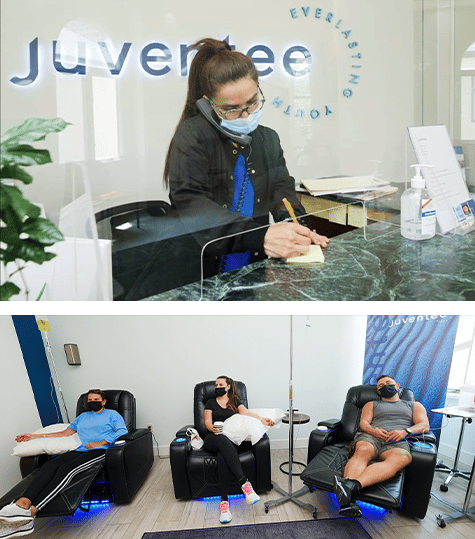
Juventee's Custom HRT Treatments for Women
Unlike some HRT clinics, Juventee's HRT programs are carefully crafted and personalized for each patient. There are no cookie-cutter solutions at our office. Instead, we assess each individual's needs and customize treatments to help their bodies as they age. We replace hormones that are deficient and restore them to their physiological state using HRT pellets.
These hormone pellets are prescription hormones inserted under the skin through a simple in-office procedure. Each pellet is about as large as a big grain of rice. Once inserted, our HRT pellets get to work quickly. With this treatment, patients don't have to worry about applying greasy creams or swallowing pills. Instead, our pellets are metabolized by the body. That way, patients don't stress over taking too much or too little.
Remember, at Juventee, our goal isn't just to balance your hormones – it's to completely optimize your health and well-being. You won't ever have to worry about our doctors writing you a prescription and sending you on your way without any additional communication. Instead, we aim to be part of our patient's journey back to health and work with all of our HRT patients to do so.
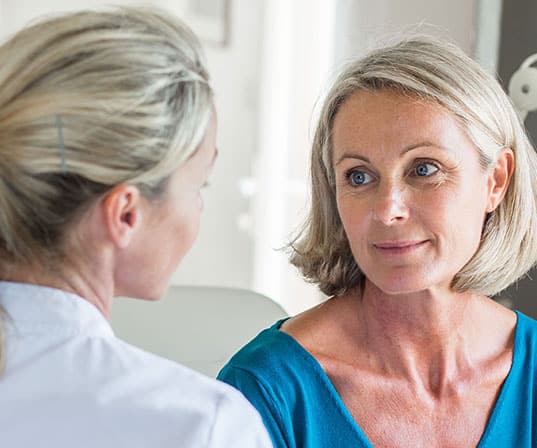
Benefits of HRT for Women in Rochelle Park, NJ
Hormone imbalance causes a litany of issues. But with hormone replacement therapy, females can better process calcium, keep their cholesterol levels safe, and maintain a healthy vagina. By replenishing the body's estrogen levels, HRT may relieve symptoms of menopause and even optimize bone health.
But that's just the start. At Juventee, our patients report many benefits of taking HRT for women:
- Less Chance of Depression
- Better Sleep
- Healthier Libido
- Not As Many Hot Flashes
- Optimal Vaginal Health
- Better Levels of Cholesterol
- Improved Memory & Concentration
- Improved Strength & Muscle Mass
- Less Risk of Breast Cancer
- Less Risk of Alzheimer's Disease
If you're ready to feel better and enjoy the vitality of your youth, Juventee is here to help you every step of the way. It all starts with an in-person evaluation, where our team will determine if HRT is right for you.
Common Issues Women Experience During Menopause
For many women, menopause is a difficult time filled with ups, downs, and hormonal hurdles to overcome. While menopausal issues are well-known by some, other women only know that menopause can affect their hormones. The reality is that going through menopause can mean more than moodiness and hot flashes.
At Juventee, we're big believers that a little knowledge can go a long way. With that in mind, if you're going through menopause or are approaching "that" age, consider these common issues. First, let's examine some alternative causes of menopause beyond age:
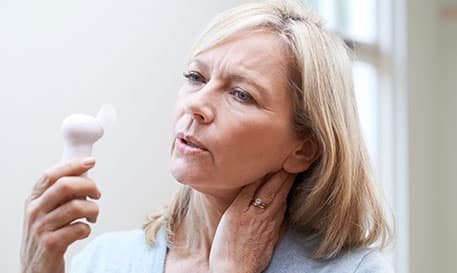
What Causes Menopause?
The most common reason for menopause is diminished, unbalanced hormones. However, menopause can also result from:
- Oophorectomy: This surgery removes a woman's ovaries and causes immediate menopause. In this situation, symptoms of menopause can be serious, as hormonal changes happen abruptly.
- Chemotherapy: Cancer treatments can cause menopause quickly, with symptoms appearing shortly after treatment.
- Ovarian Insufficiency: Referred to as premature ovarian failure, this condition happens when a woman's ovaries lose function prior to 40. Only 1% of females experience premature menopause, but HRT can help protect the heart, brain, and bones.
Now that we've examined some of the ways that menopause manifests, let's look at some common problems that females regularly endure:
Depression
If you're going through menopause and feel like life is a tiresome burden, you're not alone. Studies show that 15% of women go through depression to some degree during menopause. What many women don't learn is that depression may start much earlier, during perimenopause or even earlier.
Depression can be hard to diagnose, even without perimenopause and menopause as a factor. With that said, keep the following signs in mind. If you notice any, it might be time to speak with a physician:
- Feelings of Being Overwhelmed
- Lack of Interest
- Mood Swings
- Chronic Exhaustion
- Too Much Sleep
- Too Little Sleep
- Inappropriate Guilt
If you notice any of the signs above, it's important that you understand that you're not weak or broken. You're going through a very normal emotional experience, which may be caused by hormone deficiency. However, with proper treatment from your doctor, depression doesn't have to rule your life.
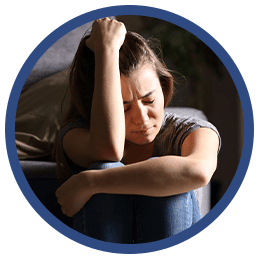
Mood Swings
You don't have to have hormonal imbalances to have mood swings. Indeed, everyone gets moody from time to time. For women going through menopause, however, mood swings can be extreme and happen often. Hormone imbalances and mood swings go together, resulting in unusual emotional changes and even issues like insomnia.
Estrogen production, a hormone that fluctuates during menopause, affects serotonin production, which regulates mood. When both hormones are deficient, mood swings can become quite prevalent.
Fortunately, HRT treatments in Rochelle Park, NJ, work wonders for women because they work to regulate hormones like estrogen. With HRT from Juventee, women don't have to settle for the negative consequences that drastic mood swings can cause.
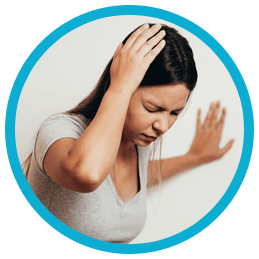
Hot Flashes
Hot flashes: whether you're a man or a woman, you've probably heard of them. Hot flashes are very common issues associated with menopause and manifest as intense, sudden feelings of heat across the upper body. Some last a few seconds while others last many minutes, making them uncomfortable and inconvenient at all times. A few common symptoms of hot flashes include:
- Overwhelming and Intense Sensations of Heat
- Nausea
- Anxiety
- Increased Heart Rate
- Dizziness
- Headaches
Usually, a lack of estrogen causes hot flashes in menopausal women. Low levels of estrogen negatively affect a woman's hypothalamus, or the part of the brain that regulates appetite and body temperature. Low estrogen levels cause the hypothalamus to assume incorrectly that the body is too hot. When it does, it dilates a woman's blood vessels to boost blood flow.
Fortunately, most women don't have to settle for the intense, unwanted feelings they endure with hot flashes. HRT pellet treatment from Juventee helps to stabilize hormones which may lessen the effects that hot flashes cause.

Weight Gain
Staying healthy and fit is a challenge for anybody living in modern America. For women with hormonal imbalances, however, it's even harder. Weight gain is a concerning issue during menopause, but it can be manageable with a physician-led diet, exercise, and HRT treatments from Juventee.
HRT patients at Juventee benefit from health plans that keep hormones in check, making weight loss a real possibility. But which hormones need to be regulated to help avoid weight gain?
- Progesterone: Depleted levels of progesterone may cause bloating and water retention, while loss of testosterone affects the ability to burn calories.
- Estrogen: As you know by now, estrogen levels are often imbalanced during menopause. As such, the body searches for other sources of the hormone. Because estrogen is stored in fat cells, your body thinks it needs to increase fat production to obtain more. The hormone also plays a big part in insulin resistance, which can make weight loss during menopause even harder.
- Chronic Stress: When we're stressed, our body's response is to believe that food is scarce. When this happens, our bodies go into "survival mode." During this process, cortisol production is altered. When cortisol timing changes, your body works harder to produce fat. With chronic stress, this process repeatedly happens, leading to extreme weight gain during menopause.

Low Libido
Millions of adults around the U.S. suffer from low sex drive, but that doesn't make it any more embarrassing to talk about. For many women going through pre-menopause and menopause, it's an unfortunate side effect of unbalanced hormones. Thankfully, HRT may help women maintain a healthy libido, even after 50. But what causes lowered sexual desire in women as they age?
The hormones responsible for low libido in females are estrogen, progesterone, and testosterone.
Progesterone production decreases during perimenopause, resulting in lowered libido in some women. Lower progesterone production can also cause weight gain, exhaustion, and other symptoms common during menopause. Reduced estrogen levels during menopause may lead to vaginal dryness and even loss of muscle tension.
Testosterone is referred to as a male hormone, but it contributes to important health functionality in women as well. Female testosterone heightens sexual responses and intensifies orgasms. When the ovaries can't produce sufficient levels of testosterone, low sex drive can happen.

Bone Density Loss
The inside of a woman's bones is broken down and rebuilt by bone cells in an ongoing process called remodeling. This process is crucial for maintaining bone strength and health.
However, due to the loss of estrogen during menopause, this important process becomes unbalanced. Less bone is formed, and more bone is broken down. This advanced state of bone loss can be worrying for women, especially if they had an early menopause. With time, women may develop osteoporosis and a greater chance of breaking bones as they age.
Fortunately, HRT for women can actually mimic estrogen and progesterone, which may help prevent bone loss and lower chances of osteoporosis in women. That's huge news for women around the U.S., many of whom are battling early bone loss due to a lack calcium, vitamin D, and other nutrients crucial to bone health.
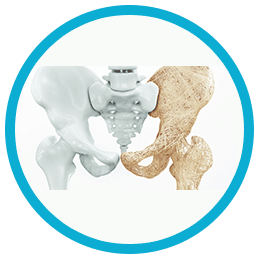
A New Youthful You Awaits at Juventee
If you are considering HRT treatments for women in Rochelle Park, NJ, you need a team of hormone replacement experts by your side. At Juventee, our knowledgeable HRT doctors are ready to help. Our team will answer your initial questions, conduct necessary testing, and craft a customized program designed to alleviate the challenges you're facing as a woman going through menopause.
With a healthy diet, exercise, positive life choices, and hormone replacement therapy, unveiling the new "you" is easier than you might think. Contact our office today to get started on your journey to optimal health and well-being.

Latest News in Rochelle Park, NJ
What weed paid for: What are NJ towns doing with marijuana taxes?
Mike Davishttps://www.app.com/story/news/local/new-jersey/marijuana/2023/07/24/nj-legal-weed-heres-what-towns-are-using-marijuana-taxes-for/70430210007/
LAWRENCE — It seemed too good to be true.Lawrence Township Manager Kevin Nerwinski didn't believe the numbers he was seeing. Verano Holdings wanted approval to open up its Zen Leaf medical marijuana dispensary in the town to recreational customers, selling legal weed to anyone over 21 years old. The company expected millions in revenue per month and, with a 2% transfer tax on every sale, a huge windfall for the township.In the first year or two, Verano told Nerwinski that the township could see as much as $...
LAWRENCE — It seemed too good to be true.
Lawrence Township Manager Kevin Nerwinski didn't believe the numbers he was seeing. Verano Holdings wanted approval to open up its Zen Leaf medical marijuana dispensary in the town to recreational customers, selling legal weed to anyone over 21 years old. The company expected millions in revenue per month and, with a 2% transfer tax on every sale, a huge windfall for the township.
In the first year or two, Verano told Nerwinski that the township could see as much as $1 million in tax revenue.
"The numbers seemed eye-popping," Nerwinski said. "And then, on Day One, there were lines around the building. And it continued for weeks and weeks and weeks."
As the New Jersey cannabis industry enters its second year of recreational marijuana sales, municipalities are beginning to reap the tax benefits promised to officials when they signed up to become first in line. While the revenues are not budget saviors for any and likely will decrease with time and competition, town officials say it’s driving real impact.
More:What we've learned, one year after NJ legal weed sales began
More than $4.6 million was collected in cannabis tax revenue in 10 of the 12 municipalities where adult-use sales began in April 2022, according to a USA TODAY NETWORK analysis of municipal budgets and interviews with municipal officials. The impact in those municipalities is varied, often depending on the size of the municipality: In small towns, cannabis tax revenue can pay for new firefighters. In bigger cities, it's simply a way of keeping costs down.
Complete tax figures were not available in three municipalities — Deptford, Egg Harbor and Paterson, where cannabis tax revenue wasn’t listed as a budget line item and municipal officials did not return multiple requests for clarification and comment.
"It's about trying to maintain a stable tax base, particularly when the cost of everything is going up," said Mike Cerra, executive director of the New Jersey League of Municipalities. "A lot of towns want to reinvest any excess revenue into their community, in terms of upgrades and infrastructure, creating more sufficient parking, making their downtowns more walkable."
Municipal officials in towns with cannabis businesses are happy to take the extra revenue, even if it's not a jackpot, Cerra said.
"I don't think anyone went into this thinking it would be a game-changer," Cerra said. "But 2% sure is better than 0%."
There are currently 35 dispensaries selling cannabis to recreational customers. Though recreational marijuana sales are now occurring in dozens of other municipalities, the Network only analyzed those municipalities where sales began on April 21, 2022, the day New Jersey officially opened its adult-use cannabis market.
According to the New Jersey Cannabis Regulatory Commission, the state itself only collected about $20.1 million in cannabis taxes last year. The state levies two taxes on cannabis — the standard 6.625% sales tax and a social equity excise fee, which is levied on cannabis cultivators and wholesalers but earmarked for disbursement to communities most impacted by the War on Drugs.
On average, municipalities analyzed by the Network collected about $465,000 in cannabis tax revenue last year, but the range goes from about $191,000 in Monroe Township in Gloucester County, from a Botanist dispensary in the Williamstown area, to more than $1 million in Bellmawr in Camden County, home of a Curaleaf dispensary.
But just how far that cannabis tax revenue will stretch is almost directly linked to the size of a municipality or, at least, its annual budget.
Bloomfield officials are anticipating $483,250 from the local RISE dispensary this year — only about 0.5% of its $99 million budget and 0.8% of its $64 million tax levy.
But in Rochelle Park, the anticipated $480,000 collected from its Ascend dispensary accounts for more than 3% of its $14.8 million budget and nearly 5% of its $10 million tax levy.
"It's been helpful in keeping taxes low, in offsetting costs. And there hasn't been a strain on any of our services," Rochelle Park administrator Dean Pinto said. "The revenue has remained constant. It's been pretty impactful, more than we thought it would be."
The clearest success story is Bellmawr, a small borough of less than 12,000 people where Curaleaf opened its first New Jersey medical marijuana dispensary in October 2015. When it began adult-use sales last year, municipal officials expected a boom, inserting a line item anticipating $659,000 in tax revenue into its 2022 budget.
But when the dust settled, the tax revenue blew past those projections and eventually topped $1 million – about 6% of the municipal budget and nearly 11% of its tax levy.
The cannabis cash went a long way, Bellmawr Mayor Charles Sauter III said. The borough used the cannabis tax revenue to create a stipend program for volunteer firefighters, encouraging more sign-ups, and to increase salaries for its EMS department. The borough spent more than double its 2022 figures on salaries and wages for firefighters, according to budget documents, and nearly $150,000 more on EMS salaries.
There are similar stories across New Jersey. In Rochelle Park, cannabis taxes totaled nearly $550,000, four times what the township collected in municipal court fines in 2022, according to the town's 2022 budget.
OPINION:What I saw in line at a South Jersey marijuana dispensary | Mullane
“I don’t think I expected we’d be in the position we’re in now, but it’s what we hoped for,” Pinto said.
Lawrence Township budgeted $450,000 for cannabis taxes in 2023, the same as it collected in 2022. But Nerwinski said that estimate is conservative: The township expects to collect about $900,000 in cannabis taxes this year, about what Nerwinski expects the township to spend on trash collection.
"It's a game changer when you're annually struggling to put together a budget that limits tax increases but preserves services," Nerwinski said. "We look back at the decision to be one of the first municipalities to take this on, to do it in a meaningful way but in baby steps, and we're really happy we did it."
But municipal officials aren’t taking the new influx of cash for granted.
The New Jersey cannabis industry is still in its early stages, with the number of cannabis businesses already ballooning, from 12 dispensaries with recreational sales in April 2022 to 35 dispensaries as of July 2023. And there’s more on the way: To date, the New Jersey Cannabis Regulatory Commission has issued nearly 800 licenses to dispensary applicants.
The rapid expansion of the cannabis industry means competition – a win for consumers, turned off by some of the country’s most expensive cannabis prices (despite some of its lowest taxes), but a potential loss for municipalities expecting tax revenues.
While the New Jersey marijuana legalization laws give regulators the ability to increase the social equity fee to ensure tax dollars are flowing even when prices fall, there’s no such mechanism for the 2% transfer tax levied by municipalities.
Last April, the Zen Leaf store in Lawrence was the only dispensary selling adult-use cannabis in a 20-mile radius. Today, it's one of nine adult-use dispensaries — with a 10th on the way. Customers who might have traveled all the way to Lawrence may instead opt for Union Chill in Lambertville, Bloc Dispensary in Ewing or Curaleaf locations in Bordentown Township and Edgewater Park.
“Every year, there's going to be more retailers coming on board and we're going to see that revenue decrease," Nerwinski said. "So we're happy to have been one of the first to get the full fruits of cannabis retail."
In short: Cheaper weed means less tax dollars, and municipalities have to plan ahead. That means putting at least some of the cannabis revenue into surplus and not letting budget projections stray too far from actual realized dollars, Pinto said.“We can try to keep looking forward,” he said, “but we always have to keep in the back of our minds that this may not last forever.”
Mike Davis has spent the last decade covering New Jersey local news, marijuana legalization, transportation and a little bit of everything else. He's won a few awards that make his parents very proud. Contact him at [email protected] or @byMikeDavis on Twitter.
Tulfra Real Estate Begins Leasing 160-Unit Apartment Complex in Rochelle Park, New Jersey
REBusinessOnlinehttps://rebusinessonline.com/tulfra-real-estate-begins-leasing-160-unit-apartment-complex-in-rochelle-park-new-jersey/
ROCHELLE PARK, N.J. — Locally based developer Tulfra Real Estate has begun leasing The Delford at Village Center, a 160-unit apartment complex in the Northern New Jersey community of Rochelle Park. The site is adjacent to Westfield Garden State Plaza Mall. The six-story building houses one- and two-bedroom units and amenities such as a pool, fitness center, coworking lounge and outdoor grilling and dining areas. Full completion is slated for March. Rents start at $2,400 per month for a one-bedroom apartment.ShareNEW YORK ...
ROCHELLE PARK, N.J. — Locally based developer Tulfra Real Estate has begun leasing The Delford at Village Center, a 160-unit apartment complex in the Northern New Jersey community of Rochelle Park. The site is adjacent to Westfield Garden State Plaza Mall. The six-story building houses one- and two-bedroom units and amenities such as a pool, fitness center, coworking lounge and outdoor grilling and dining areas. Full completion is slated for March. Rents start at $2,400 per month for a one-bedroom apartment.
Share
NEW YORK CITY — Dallas-based JSC Realty & Investment Services has purchased a multifamily development site in Brooklyn’s Boerum Hill neighborhood with plans to construct a 154-unit project. The 113,000-square-foot site at 540 Atlantic Ave. currently houses a five-story office building that was originally constructed in 1924 and will be demolished. Stephen Palmese, Brendan Maddigan, Michael Mazzara, Ethan Stanton and Winfield Clifford of JLL represented the seller, locally based firm DMA Associates, in the land sale. A construction timeline for the project was not disclosed.
NEW YORK CITY — Marcus & Millichap has brokered the $48 million sale of Fannwood Estates, a 312-unit apartment complex in Queens. The six-story, rent-stabilized building occupies a full city block within the borough’s Rego Park neighborhood. Shaun Riney, Seth Glasser, Joe Koicim, Louis Zarif and Sean Fopeano of Marcus & Millichap represented the seller and procured the buyer in the transaction. Both parties were private investors that requested anonymity.
SCOTTSDALE, ARIZ. — CBRE has brokered the sale of a restaurant property located at 3748 N. Scottsdale Road in Old Town Scottsdale. Scottsdale-based The Shipp Family purchased the building from a private individual investor for $3.6 million.
Good Life Sports Bar and Grill signed a 10-year, triple-net lease to occupy the 5,265-square-foot property, which another restaurant formerly occupied. This location will be the Omaha, Nebraska-based chain’s first location in Arizona.
Built in 1957, the two-tenant building is currently being renovated for the new tenant that is slated to open next year.
Joe Campagno and Benjamin Farthing of CBRE negotiated the transaction.
PALM DESERT, CALIF. — Hanley Investment Group Real Estate Advisors has arranged the sale of a multi-tenant retail property located at 39575 Washington St. in Palm Desert. A Los Angeles-based private investor sold the asset to a San Diego-based private 1031 exchange investor for $3.9 million.
Bill Asher and Jeff Lefko of Hanley Investment Group represented the seller, while Omar Hussein of Del Mar-based Beacon Realty Advisors represented the buyer in the deal.
Built in 2008, the 8,500-square-foot retail property offers four tenant suites. At the time of sale, the property was fully occupied by Chipotle Mexican Grill (under a new 10-year, triple-net, corporate lease), Cornerstone Pharmacy, Luxury Nails & Spa and Keller Williams Realty Coachella Valley | Jelmberg Team.
The Delford: 160-unit luxury apartment complex in Rochelle Park opens leasing
Linda Lindnerhttps://www.roi-nj.com/2023/12/06/real_estate/the-delford-160-unit-luxury-apartment-complex-in-rochelle-park-opens-leasing/
With its grand opening four months away, the Delford at Village Center in Rochelle Park is quickly gaining recognition as a highly desirable rental community in Bergen County. Tulfra Real Estate, the developers behind this six-story, 160-unit luxury rental community, have announced that leasing has commenced, and hardhat tours are underway.“It’s an extremely exciting moment,” Sonny...
With its grand opening four months away, the Delford at Village Center in Rochelle Park is quickly gaining recognition as a highly desirable rental community in Bergen County. Tulfra Real Estate, the developers behind this six-story, 160-unit luxury rental community, have announced that leasing has commenced, and hardhat tours are underway.
“It’s an extremely exciting moment,” Sonny Jumani, CEO and president of Tulfra Real Estate, said. “Hundreds of prospects have already inquired and have been anxiously awaiting the announcement of project tours. The Delford has everything anyone could want: spectacular one- and two-bedroom luxury apartments, generous amenities and a superb location.
“Our goal was to create more than just a residence; we envisioned a lifestyle that seamlessly blends luxury with practicality. The Delford’s strategic location adjacent to the Westfield Garden State Plaza places it at the crossroads of shopping, dining and entertainment, redefining the convenience of urban living. As a result, the response to the Delford’s upcoming launch has been overwhelmingly positive.”
The Delford will offer a diverse range of layouts to cater to various lifestyles. Its spacious one-bedroom apartments provide a cozy yet elegant living space, ideal for young professionals. On the other end, the larger, two-bedroom apartments feature private balconies, providing a serene retreat for families or those desiring more space.
“The design philosophy centers around the concept of the ‘Inside of Living’ — a holistic approach that integrates comfort, style and functionality,” Marcus Lee, asset manager at Tulfra Real Estate, said. “Each apartment offers top-tier appliances, expansive kitchen areas and extensive closet space, reflecting a commitment to quality and detail. The Delford’s amenities will set it apart as a pinnacle of luxury.”
Residents also will be treated to a coworking lounge with private offices, a state-of-the-art fitness center with pool deck views and a stunning outdoor swimming pool. Barbecues with outdoor dining areas, a tranquil landscaped area with a pond, resident storage solutions for bicycles and packages, covered garage parking and an on-site concierge round out the extensive list of amenities designed for an active and social lifestyle. With a convenient location near all major highways and transportation hubs, the Delford also provides easy access to scenic parks, diverse dining options, and essential services.
“These facilities not only offer convenience but also foster a community atmosphere,” Lee said. “We’re not just building apartments; we’re cultivating a vibrant, connected community.”
Powerful storm floods riverside communities in Bergen County, New Jersey: "We can't keep going through this"
Elijah Westbrookhttps://www.cbsnews.com/newyork/news/powerful-storm-floods-riverside-communities-in-bergen-county-new-jersey/
OAKLAND, N.J. -- Residents along several rivers in Bergen County woke up to floodwaters again Wednesday, and some communities are still waiting for the worst.CBS New York's Elijah Westbrook spent the morning in several impacted towns. At noon, he reported from Carlstadt, where the flooding prompted evacuations.Several parking lots badly flooded along Gotham Parkway, making it difficult for people to get to their cars or,...
OAKLAND, N.J. -- Residents along several rivers in Bergen County woke up to floodwaters again Wednesday, and some communities are still waiting for the worst.
CBS New York's Elijah Westbrook spent the morning in several impacted towns. At noon, he reported from Carlstadt, where the flooding prompted evacuations.
Several parking lots badly flooded along Gotham Parkway, making it difficult for people to get to their cars or, in some cases, leave their buildings.
The fire department set up a command across the street for anyone who may need help evacuating.
Westbrook began his morning in Oakland, where the waters had started to recede after pouring onto properties overnight.
The flood area sits right between two bodies of water -- Crystal Lake to one side and the Ramapo River on the other. One longtime resident said it was so bad, the fire department had to come out.
"About 12:30 this morning, I was woken up by the fire department, because at that time they'll ask you if you want to evacuate and everything. So I went outside, checked our lake, which is Crystal Lake, and it was completely starting to go in the backyard. Then, the road here was completely covered where you couldn't get a vehicle through," she said. "We're still concerned, because they're going to say it's going to crest this afternoon, and the river is really high."
Another resident walking his dog said his roof started leaking under the stress of the heavy rainfall.
"It was about a-quarter-to-3 and all of a sudden, I feel something dripping on my head. I'm like, 'Oh no.' Got out of bed, woke up the wife, turned the lights on, and I see water dripping out of my ceiling fan," said Howard Mednikoff. "I felt like Dorothy in 'The Wizard of Oz.' It was really bad. I don't know if something fell. I didn't hear a big clunk on my roof, so I don't know if a tree fell. It's too dark for me to see."
Watch Tony Sadiku live in Lodi
Westbrook later went to Rochelle Park, where residents on Cedar Drive had to walk in knee-deep water to move their cars.
"My yard is flooded because there's a storm drain that runs through the whole thing. I have probably a good foot and a half of water against my fence line," resident Robert Belli said.
"We get water here, usually when the rain is real heavy. But now, it's 2-3-inch rains. We're starting to get water up the street, and that's killing us here. You've got to sit and worry all day about water going in your garage, down your basement. Three times already I lost the basement and the first level," another resident said.
Westbrook asked him what's next for his neighbors on the block.
"We've got to hope the water stops and starts receding, which it looks like it might be now. But we can't keep going through this," the man replied. "The town has done nothing to help anybody here with the flooding. They just put cones up and say don't go down the street. But I'll be looking to sell in the spring."
Officials with the Rochelle Park Office of Emergency Management said they did not receive any calls about people being trapped, damage to homes or injuries, but they continue to monitor the situation.
Hear from Gov. Phil Murphy on storm impact
The nearby Saddle River also breached its banks and flooded in Lodi. CBS New York's Tony Sadiku reported from Main Street, where the water crested around 10 feet, submerging the street from Sydney to Kennedy.
Public schools closed for the day, along with several local businesses. One business owner said he was there since 4:30 watching the water rise.
"They said 12 o'clock is supposed to be the height of the crest, so, hopefully, it will only crest another foot and then it won't go inside my building. If it does, then we're in trouble," said Frank Staffa. "This is bad, but I've never seen it this high."
Sadiku also spoke with residents on Money Street who said it's some of the worst flooding they've seen in years.
"Downtown, there's literately rushing water going over people's houses, flooding people out of their apartments. They've got the cops pulling people out by the school," one man said. "Seems like it's all just coming this way and going into downtown. The people over there, they've got boats ready to do something and get people out of there."
It was officially the seventh-highest crest for the river on record.
Watch Paterson mayor on storm impact
Downstream in Passaic County, Paterson Mayor Andre Sayegh reported a dozen rescues and 30 street closures due to localized flooding. He said at least 20 people were accommodated at a shelter and no injuries were reported.
Sayegh told CBS New York his team is keeping an eye on the Passaic River, which caused devastating flooding last month.
"Expected to crest tomorrow at approximately 5 p.m., and it could be 10 feet or more," he said at a briefing later in the morning. "Which is a similar situation to what occurred a few weeks ago, which would adversely impact residents who are in the low-lying areas."
CBS New York also spoke with the mayor of Little Falls, who said, so far, the town has only seen localized street flooding -- nothing like the damage from a few weeks ago.
"Now, of course, all focus is turned to the Passaic River, where we're continuing to monitor the gauges," said Mayor James Damiano. "Stay strong. We're going to get through this together, and Little Falls will be there for you."
Hear from Little Falls mayor on storm impact
Gov. Phil Murphy issued a state of emergency for the storm that's expected to wrap up Wednesday. He told CBS New York's Chris Wragge the flood concerns aren't in the clear.
"A decent amount of flooding, a decent amount of power outages. It was a storm about as we expected, and thank God it's through the system," Murphy said. "We've got something else coming in in a couple of days, and the worry there is the cumulative effect will have a big impact here with such saturated ground in particular."
Wragge asked the governor about back-to-back storms, and what more can be done to help local municipalities with their mitigation efforts.
"There's good news and then there's challenging news," Murphy replied. "The good news is we work well with these mayors and we've made some significant progress. The bad news is Mother Nature ain't going away. The storms are more frequent and more intense, and we are -- not just in New Jersey, I'd say, in American and around the world -- we're chasing these storms, as opposed to getting out ahead of them."
Schools in Paramus, Ridgewood and Montclair had a two-hour delayed opening Wednesday, and Paterson schools were to be dismissed early. Students in Woodland Park have remote classes, and Randolph schools will be closed for the day in Morris County.
As of 11 a.m., PSE&G New Jersey reported 7,753 customers without power, and JCP&L had 25,666 outages.
As people start to survey the damage, they're reminded to watch for downed power lines and avoid any floodwaters.
Stick with our First Alert Weather team for the latest forecast and coverage of the cleanup.
Elijah Westbrook is an Emmy Award-winning journalist. He joined CBS2 News and CBS News New York in January 2022.
Dunkerhook Road, Paramus, is Closed Due to Flooding
TAPintohttps://www.tapinto.net/towns/paramus/sections/bergen-county-news/articles/dunkerhook-road-paramus-is-closed-due-to-flooding
You May Also Be Interested InBergen County NewsThe Valley Hospital Named One of America's 100 Best Hospitals for 2024 by Healthgrades ...
You May Also Be Interested In
The Valley Hospital Named One of America's 100 Best Hospitals for 2024 by Healthgrades
Fans Lining Up for Rapper 50 Cent's Bottle Signing at Stew Leonard's, Paramus
Audrey Meyers, CEO of Valley Health System, Named on 2024 NJBIZ Power 100 List
RIDGEWOOD, NJ - Valley Health System congratulates Audrey Meyers, Chief Executive Officer ...
RIDGEWOOD, NJ - The Valley Hospital is pleased to announce treatment of the first patient ...
RIDGEWOOD, NJ -The Valley Hospital is proud to announce it is a winner in the Clinical ...
Home & Garden
By MELINDA MYERS
NEW JERSEY - Just like us, insects spend their winters in different locations. Unlike us, ...
Cold Blooded by Anita Paddock
Cold Blooded by Anita Paddock. Pen-L Publishing, 2019. Dubbed by her friends as ...
It's the Thought That Counts
I was perplexed to learn via breaking headline news recently that Elon Musk has ...
Disclaimer:


 201-292-0706
201-292-0706
